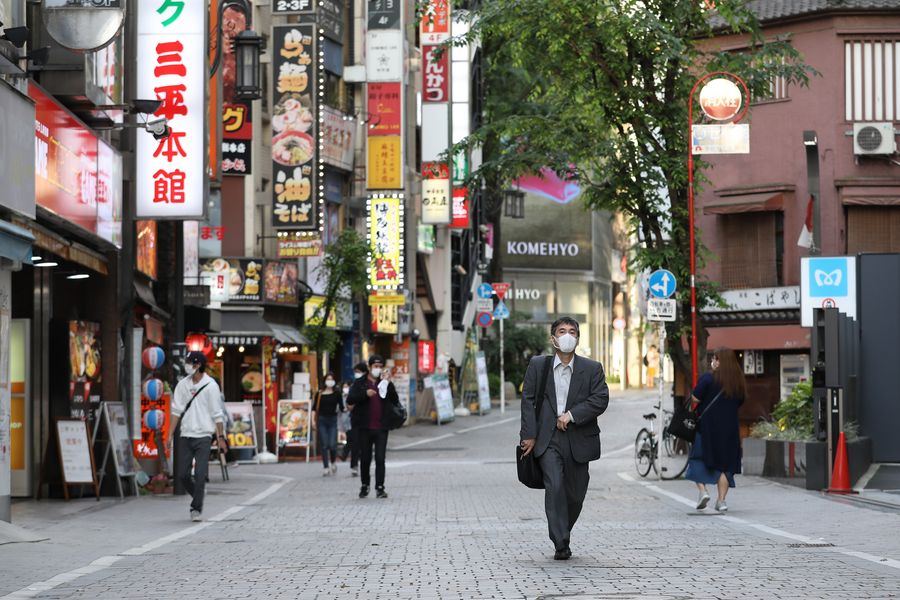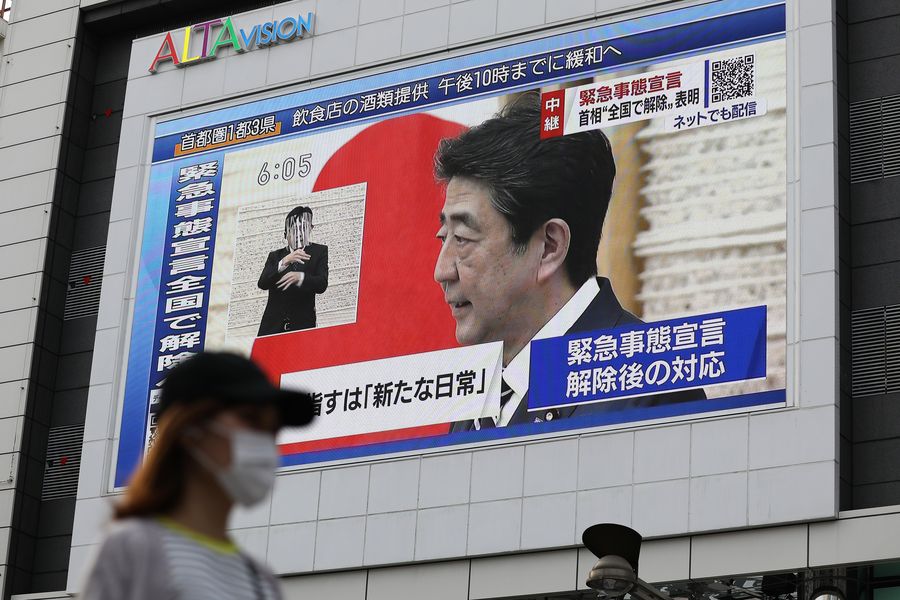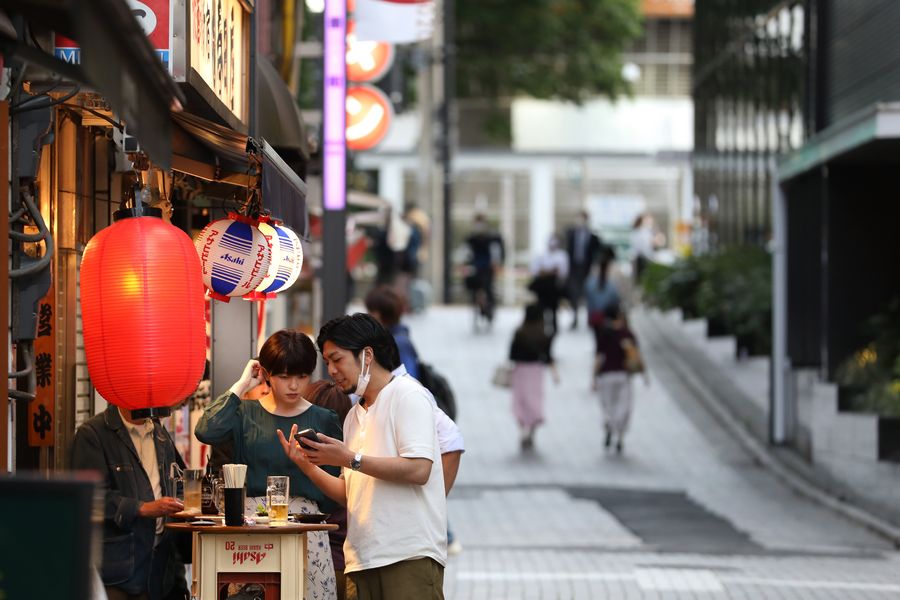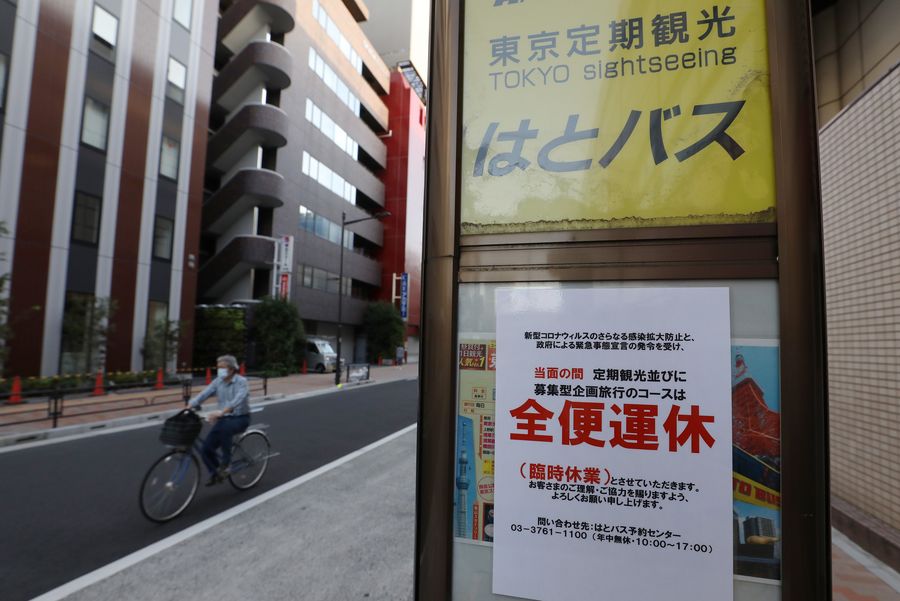
People wearing face masks walk in a street in Shinjuku, Tokyo, Japan, on May 25, 2020. (Xinhua/Du Xiaoyi)
Restoring domestic demand in post-virus emergency Japan would be vital for the recovery of the country's recession-hit economy, but the world's third-largest economy is facing some serious headwinds, said Japanese Economic Revitalization Minister Nishimura Yasutoshi.
TOKYO, May 27 (Xinhua) -- Japanese Economic Revitalization Minister Nishimura Yasutoshi said Tuesday that restoring domestic demand in post-virus emergency Japan would be vital for the recovery of the country's recession-hit economy, but the world's third-largest economy is facing some serious headwinds.
Nishimura made the remarks a day after the government lifted the state of emergency declared over the COVID-19 outbreak for the whole of Japan, owing to the virus spread largely being brought under control.
He told reporters that the economy in the short term needed to be driven by domestic demand, with momentum being gained as the government's phased plan to return the economy to normal, especially with the relaxing of restrictions for travel and the holding of large events, starts to take effect.
The lifting of the virus emergency comes amid recessionary pressure and concerns over a possible second and even third wave of COVID-19 infections, meaning that consumption, which accounts for 60 percent of Japan's GDP, may remain stifled as individuals and households continue to tighten their purse-strings amid an uncertain future.
Earlier this month, the government said Japan's economy shrank for a second straight quarter in the January-March period and had entered a technical recession as a result of the adverse effects of the COVID-19 pandemic.

An electronic screen shows that Japanese Prime Minister Shinzo Abe speaks at a press conference in Tokyo, Japan, on May 25, 2020. (Xinhua/Du Xiaoyi)
The Cabinet Office said the economy shrank by an annualized real 3.4 percent in the January-March period from the previous quarter, with the decrease in the quarter corresponding to a 0.9-percent decline on a seasonally adjusted quarterly basis.
In the final quarter of 2019, the economy also shrank, mainly due to a consumption tax rate hike from 8 percent to 10 percent, triggering a slump in consumer demand and business spending.
Adding to economic woes, the Cabinet Office also said earlier this month that private capital expenditure declined 0.5 percent, in the recording period, while private residential investment fell 4.5 percent.
Nishimura said the downside effects of the coronavirus pandemic on Japan's economy are expected to see it deteriorate further. The economy will "slow down to a considerable extent for the time being."
Looking ahead to the April-June quarter, he indicated that a further economic contraction was expected as the state of emergency declaration, which saw businesses shuttered and the movement of people restricted, would have caused the figures for April and May to decline significantly.

People enjoy their time at a restaurant in Shinjuku, Tokyo, Japan, on May 25, 2020. (Xinhua/Du Xiaoyi)
Meanwhile, in the central bank's quarterly "Sakura Report" released last month, the Bank of Japan said that all of the country's nine regional economies "had been weak or facing strong downward pressure" from the spread of the coronavirus, with the bank lowering its view on all the regions for the first time since January 2009 in the wake of the global financial crisis.
The BOJ's latest report said that many manufacturers' sentiment had worsened and many Japanese companies had expressed their concerns over global demand slumping and weak domestic spending due to the global spread of the virus.
The central bank's most recent report came on the heels of its Tankan survey, regarded as a leading indicator of Japan's economic health, released the same month, revealing that Japan's large manufacturers' business confidence had turned negative for the first time in seven years, as sentiment was severely hurt by fears of the global economic impact from the pandemic.
The sentiment index plummeted to minus 8 from zero in the recording period, marking its lowest level since the same reading was logged in March 2013, the BOJ said, adding that the index for large non-manufacturers stood at plus 8, diving from plus 20 in December's survey.
Looking ahead, the sentiment index for large manufactures is expected to fall to minus 11 in the months ahead, as concerns mount over the fallout of global companies shuttering operations and the continuation of supply chain disruptions linked to the pandemic.

A sign shows that a sightseeing bus service is currently not available in Ueno, Tokyo, Japan, May 24, 2020. (Xinhua/Du Xiaoyi)
The index, looking ahead, is also likely to reflect concerns over falling global and domestic consumption and a decline in domestic economic activities following the emergency virus declaration initially being announced.
The nation's key export sector has also been severely damaged by the pandemic, with the Finance Ministry saying this month that exports logged their steepest drop in April in more than 10 years as the COVID-19 pandemic saw overseas demand slump amid global business shutdowns and stay-at-home orders.
Exports in the recording period plummeted 21.9 percent from a year earlier to 5.20 trillion yen (48.41 billion U.S. dollars), marking the 17th straight month of decline.
The decline marked the steepest drop since a 23.2-percent dive booked in October 2009 in the wake of the global financial crisis, the ministry's data showed.

Staff members wearing face masks work at Shinjuku Station in Tokyo, Japan, on May 25, 2020. (Xinhua/Du Xiaoyi)
Imports, meanwhile, dropped 7.2 percent to 6.13 trillion yen (57.07 billion U.S. dollars), marking the 12th straight month of decline, owing to slumping purchases of crude oil and coal among other energy resources, according to the ministry.
While Nishimura said Tuesday that he believed the global economy will gradually recover, as infections are continuing to spread in some countries, Japan cannot expect to see a sudden resurgence of its key export sector.
On a brighter note, Nishimura said the government is planning to bolster the economy while implementing measures to prevent new infections of the coronavirus.
Such plans involve the near doubling of the government's emergency coronavirus package to over 200 trillion yen (1.86 trillion U.S. dollars) from the current 117.1 trillion yen (1.09 trillion U.S. dollars), as confirmed by Japanese Prime Minister Shinzo Abe on Monday.
With the supplementary budget to be financed by the government issuing more deficit-covering bonds, Nishimura maintained that now was the time to be proactive.
"Now is not the time to worry about fiscal reconstruction. It's more important than anything else to secure a necessary budget to protect people's livelihoods, employment and businesses," said Nishimura. ■



